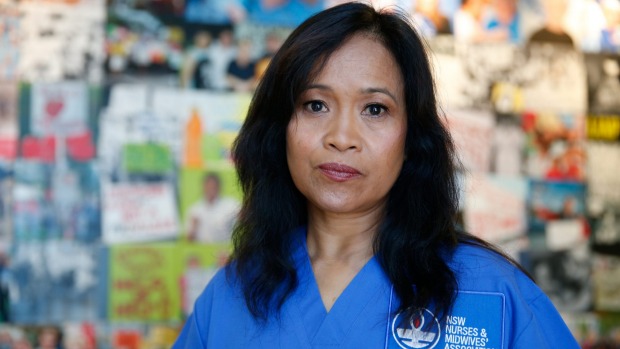
Jocelyn Hofman, a registered nurse from the Blue Mountains, is concerned changes to nursing laws could be dangerous for residents in nursing homes. Photo: Peter Rae
Registered nurse Jocelyn Hofman has faced a lot in her career. But after nearly 30 years looking after vulnerable nursing home residents in the Blue Mountains, she is scared.
NSW nursing homes could soon be able to operate without registered nurses on site because of changes to the federal funding system for aged care. She says if this move goes ahead, it could leave elderly people without the medical care needed to keep them alive and prevent unnecessary suffering.
“I’m very scared for the future of aged care if this goes ahead. We need the public to know because the public doesn’t realise what is going on,” Mrs Hofman said. “It is a big thing for families to bring their loved one in to a nursing home, and they want to know they are being looked after. We are all entitled to medical care, and that doesn’t diminish when you get older.”
Nurses and specialist geriatric doctors say the change should not go ahead, while Alzheimer’s Australia NSW says it threatens the “basic human rights” of some of the state’s most vulnerable people. However, the body representing high-care nursing homes says the law is unnecessary red tape that is not adequately policed anyway.
Mrs Hofman says registered nurses are intimately involved in ongoing assessment of people who are already frail and unwell, and can deteriorate without people noticing. They are constantly assessing things like swallowing, cognitive abilities and diet; can know if a feeding tube is blocked, manage palliative care medication or treatment for chronic disease.
NSW Nurses and Midwives Association general secretary Brett Holmes said the problem had emerged after federal changes to the way nursing homes are funded last year essentially abolished the distinction between “high care” and “low care” homes, and instead directed funding towards individuals. This meant that NSW legislation that mandated all high-care facilities had registered nurses essentially became invalid.
NSW Health said in the meantime nearly 600 facilities had been covered by interim legislation that ensured those with registered nurses continued using them. The government has been consulting on what to do next, with a report into the matter due in July.
“The majority of the employers will do the right thing, but there are employers who are driven by the profit motive who are currently saying ‘we can’t afford to deliver at that standard’,” Mr Holmes said. “We need laws for that group of people who wont do the right thing”.
The Association has put together a petition, hoping to collect 10,000 signatures and get the issue debated in parliament.
Alzheimer’s Australia NSW chief executive John Watkins wrote to NSW Health Minister Jillian Skinner in January to express concern about potential harm arising from changes.
“High-quality aged care for people living with dementia is a basic human right for a most needy group of Australians,” he said.
“It is inappropriate and unacceptable that steps could be taken to downgrade the qualifications of those who care for aged people with dementia in nursing homes. I cannot understand the push for such a change.”
Lyndal Newton, from the Australian and New Zealand Society for Geriatric Medicine, said doctors who specialised in aged care were concerned that the current laws provided an important safety net.
“If a facility has high-level residents in it, there should be registered nurses,” she said. “You have people who will live in these facilities for a long time, and as they get to the end of their life [and need high care]… this would mean you will be relying very much on the facility or the service provider to decide when they need a registered nurse.”
“Some facilities are excellent and they will provide that, but others may not.”
She said if registered nurses were not available, aged care homes would be more likely to send residents directly to hospital.
But Charles Wurf, the chief executive officer of Leading Age Services Australia NSW-ACT, the peak body for high-care operators, said the law was a hangover from the days when aged care facilities were primarily regulated by the states, but were not relevant now the system had shifted towards federal regulation.
He said it was flatly wrong that removing the law would negatively impact elderly residents.
“We have a conservative quality framework that provides requirements on us to meet our duty of care, to keep our staff levels appropriate,” he said. “The professional in me won’t say that there’s no way you can completely say that [inappropriate staffing] could ever occur, but I would go on to say it’s far more likely to be picked up and monitored by the federal aged care framework”.
But registered nurse Jocelyn Hofman says nurses are increasingly seeing the pressure on aged care facilities to do more with less.
“It’s all about money,” she said. “The elderly are not a commodity, they are a loved one, someone’s mother, someone’s father, aunties, uncles. We have got to look after them because that is what a decent society does”.
NSW health minister Jillian Skinner said she would await the report in July. NSW Health said it was committed to “providing all residents of aged care facilities a high level of care that addresses their complex health needs”, which was why it had put in place transitional arrangements and established the steering committee.
